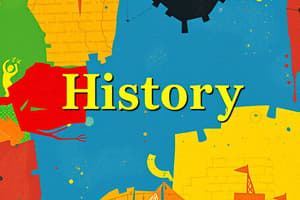Podcast
Questions and Answers
What does the term 'historia' mean in Greek?
What does the term 'historia' mean in Greek?
Knowledge acquired through inquiry or investigation
Which of the following is NOT a role that history has played in the past?
Which of the following is NOT a role that history has played in the past?
- To unite a nation
- To promote the latest technology (correct)
- To legitimize regimes
- To forge a sense of collective identity
Positivism requires empirical evidence to claim knowledge as true.
Positivism requires empirical evidence to claim knowledge as true.
True (A)
What is the main focus of postcolonial history?
What is the main focus of postcolonial history?
What does the mantra 'no document, no history' signify?
What does the mantra 'no document, no history' signify?
Which school of thought focuses on the history of social groups and longer historical periods?
Which school of thought focuses on the history of social groups and longer historical periods?
The methods and rules that historians follow are referred to as ______.
The methods and rules that historians follow are referred to as ______.
The Annales School of History ignored the history of states and monarchs.
The Annales School of History ignored the history of states and monarchs.
Flashcards are hidden until you start studying
Study Notes
Introduction to History
- History is derived from the Greek word "historia," meaning knowledge gained through inquiry.
- It encompasses past events, their causes, and historical narratives.
- Historiography studies how historians develop their discipline, including various interpretations of history.
Importance of History
- Unites nations and legitimatizes regimes.
- Forges a collective identity among people.
- Understanding the past helps contextualize the present and develop nationalism.
- Offers heritage appreciation and broadens perspectives.
- Aids in critical thinking and understanding social relationships.
Historical Methodologies
- Positivism: Emerged between the 18th and 19th centuries, focused on empirical evidence and objective conclusions. Emphasizes "no document, no history," insisting on primary sources for historical narratives.
- Postcolonialism: A response to colonial histories, highlighting national identity and critiquing colonial methods. Aims to reshape narratives that liberate identities from colonial discourse.
Debates in Historical Study
- Questions the possibility of absolute historical truth and objectivity within the discipline.
- Recognizes that facts need interpretation and cannot speak for themselves without context.
Historical Methodology Techniques
- Involves specific techniques and rules for utilizing sources and evidence, essential for resolving conflicting accounts.
- Evaluates the validity of eyewitness accounts and oral histories as historical evidence.
The Annales School of History
- Originated in France, challenging traditional historical narratives that focus solely on states and monarchs.
- Emphasizes social history and the experiences of common people, studying long-term historical trends.
- Advocates for inclusion of marginalized voices in historical records, promoting "history from below."
Historical Sources
- Primary sources: Created during the event or time period being studied, essential for authentic historical investigation.
Studying That Suits You
Use AI to generate personalized quizzes and flashcards to suit your learning preferences.




